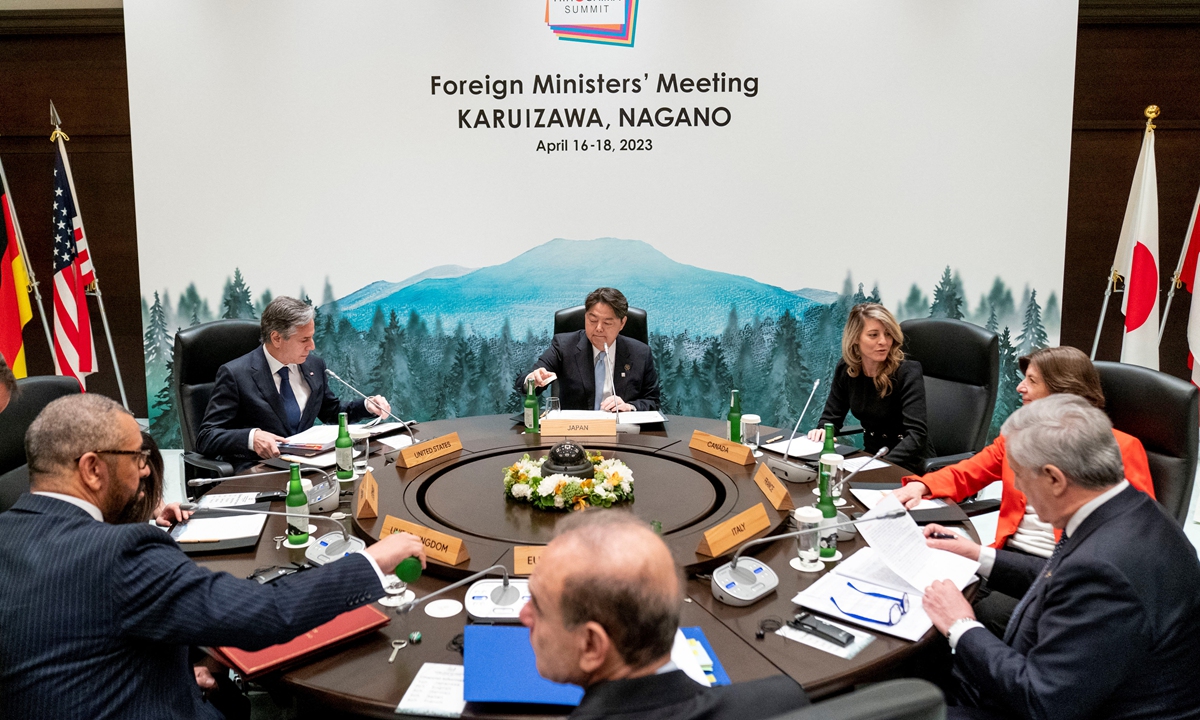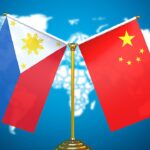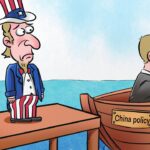The G7 Foreign Ministers’ Meeting, which took place from April 16 to 18 in Nagano, Japan, served as a preview of the G7 summit scheduled to be held in May. Generally, the tone set by the foreign ministers’ meeting is likely to be similar to that of the G7 summit. The G7 foreign ministers’ joint statement, which reflects the main tone of the meeting, will be released on April 18, but the key points have already been leaked by several foreign media outlets, indicating that the “tensions over China will be high on the agenda” of the meeting.
According to reports, at working dinner on April 16, the foreign ministers of the G7 countries reaffirmed the “importance of peace and stability in the Taiwan Straits,” and also stated that maintaining unity among the G7 is “extremely important” in addressing the various challenges in the Indo-Pacific.” Some media analysts believe that the urgent need to demonstrate so-called “unity” and the blatant interference in China’s sovereignty reflects possible anxiety raised by Macron’s call for the EU not to become a “follower” of Washington on the Taiwan question. There are also analysts who believe that there is a possibility of cracks appearing within the G7.
Overall, this G7 foreign ministers’ meeting has two main characteristics. Firstly, it continues and intensifies the ideological and new Cold War atmosphere of the G7, further pushing a complete shift for the G7 from a rich countries’ club focusing on global governance and economic issues towards a geopolitical tool which promotes bloc confrontation. Secondly, as the host of the G7 presidency this year, Japan has added a pungent Japanese seasoning to the traditional American formula of the G7 meeting. Specifically, this includes a focus on interfering in the Taiwan question, hyping the “China threat” theory, and seeking G7 support for its plan to dump nuclear-contaminated wastewater into the sea.
As the sole Asian member of the G7, every time Tokyo hosts a G7 summit, it seeks to actively assert its “Western identity” on Asian soil and thereby gain a stronger presence. While Japan is strengthening the G7’s China containment functions under Washington’s direction and trying to achieve a political rallying of the US alliance system close to China, it is also stuffing the group with its own selfish interests. This has not played any positive role and should be condemned by all parties. It is reported that the G7 UK Summit in 2021 first made a fuss about the Taiwan question in a joint statement, which was secretly promoted by Japan under the encouragement of the US. This time, with Japan hosting the G7, its impulse to rope in external forces to interfere in the Taiwan Straits is even more blatant, making the G7 more and more of an actual external threat to peace and stability in the Taiwan Straits.
It is ironic that while the G7 foreign ministers are eagerly showing focus “in unanimity outwards” with the efforts of Japan, the G7 is facing a crisis of trust brought on by the leak of confidential documents revealing US monitoring allies, as well as the growing sense of independence and autonomy in Europe that is challenging the transatlantic alliance. These fissures are prominent and weaken the G7’s unified voice on some issues, making the solidarity displayed by the G7 foreign ministers seem deliberate and unnatural. The role that the US now assigns to the G7 is, to put it plainly, G1, a small circle led by the US that follows order from Washington. However, this is the idealistic G7 that Washington hopes for, and in reality, it is not the case.
It is worth noting that the joint statement issued by G7 Meeting on Climate, Energy and the Environment on Sunday did not provide the support that Japan had hoped for regarding its plan to discharge nuclear-contaminated wastewater into the sea. Germany’s Minister for the Environment, Nature Conservation, Nuclear Safety and Consumer Protection Steffi Lemke even protested during the press conference, stating that she “cannot welcome the release of the treated water.” It is well known that Asian neighboring countries such as China and South Korea have long been strongly opposed to Japan’s plan to discharge nuclear-contaminated wastewater into the sea, but the US has been lenient. The open disagreement within the G7 indicates that in today’s world, where the interests of all people are closely intertwined and our destinies are shared, it is difficult to continue promoting the Cold War-style ideological division of blocs, even within the Western world. The continuously emerging and increasingly severe global issues present a strong need for solidarity and cooperation among all human beings. Engaging in bloc confrontation goes against the tide and will inevitably encounter greater resistance.
Frankly speaking, the representativeness of G7 in the international community has significantly declined. When it was established in the 1970s, G7 countries accounted for 70 percent of the global economy, but now this share has dropped to about 40 percent. According to the World Bank’s estimation, from 2013 to 2021, the total contribution of G7 countries to global economic growth is less than that of China alone. The representativeness of G7 in terms of population is even less, as its member countries account for less than 10 percent of the world’s population. Nowadays, as Washington wants to further turn G7 into a “coordinated command center” under the US State Department, and its bloc confrontational nature is becoming more and more pronounced, it brings more destructive rather than constructive effects to the world.
“Unity” is now the most commonly shouted slogan when G7 countries gather. Although G7 as a whole maintains a relatively consistent attitude on the surface, this is more a forceful expression of Washington’s interests and the forced bundling of promoting confrontational blocs. In fact, the debate on whether to independently develop foreign relations or be a vassal of the US has already emerged in the West. Against this backdrop, no matter how G7 wants to show “unity”, one thing is certain: no matter what group or alliance, if it deliberately creates opposition and friction, its future will be one of decline.













